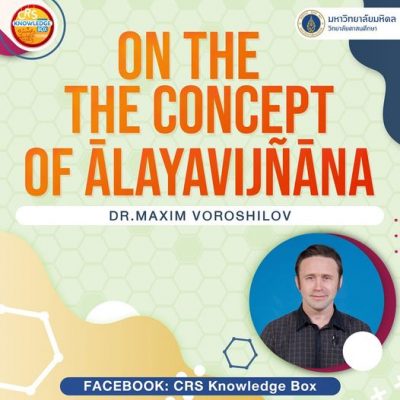My contribution to the knowledge box today will include a discussion of the concept of ālayavijñāna. My interest is determined by my translation and study of the Pañcaskandhakavibhāṣā by Sthiramati? which is his commentary on the Pañcaskandhaka by Vasubandhu.
The concept of ālayavijñāna, also known as store-consciousness, the treasury of consciousness is a concept unique to the philosophy of yogācāra. It could be called an addition to the six kinds of consciousness, accepted by the Sarvāstivāda Abhidharma, which include five kinds of consciousness related to the senses and mind. The yogācāra tradition adds too more level sof consciousness: kliṣṭamanas (polluted mind) and the ālayavijñāna.
This eighth kind of consciousness unheard of in the previous traditions seems to take upon itself an important mission: it is to explain quite a few doctrinal inconsistencies (or gaps) Earlier traditions could not account for.
According to L. Schmithausen whose studies of ālayavijñāna not only are considered groundbreaking but also show unprecedented level of scholarship regarding the issue, there are following reasons and contexts for the sake of justifying which the adoption of the concept of ālayavijñāna had been needed and had been welcome in the yogācāra teaching.
(1) the issue of a continuous subject of saṃsāra
(2) the issue of connecting action with its result
(3) the problem of connecting the last moment of mind before the state of cessation (nirodhasamāpatti) and the first moment of mind after that state.
(4) the problem of necessity of an entity that would receive impressions (vāsanā) and support the seeds of saṃsāra.
(5) the problem of having a basis for the feeling of I.
(6) the problem of a principle that becomes a basis of a new existence and after death and ensures a being’s future birth in the proper destination (gati) i.e. human realm, animal realm, hells etc.
(7) the issue of mind — during the life of a living being — appropriating or taking possession of the “corporeal matter“.
(

the necessity to make sure that mind enters the womb at the moment of linking up (pratisandhi).
(9) in order to justfy the principle of pollution.
The genesis of the concept of ālayavijñāna is traced to the limb of consciousness (consciousness at the time of conception) in the chain of dependent arising.
